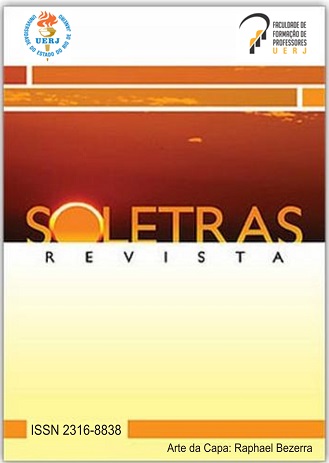Second person singular object pronouns: an analysis of 20th century writing by Graciliano Ramos
DOI:
https://doi.org/10.12957/soletras.2025.90040Keywords:
Sociolinguística Histórica, Graciliano Ramos , Fatores Linguísticos, Língua escritaAbstract
In this paper, we analyze the use of second-person singular object pronouns in personal letters by Graciliano Ramos, with the aim of analyzing which linguistic and extralinguistic factors influenced the advancement of the forms of the você paradigm and which acted as resistance and favored the tu paradigm. To this end, we analyzed 110 letters written between 1910 and 1952 by the illustrious alagoan in response to family members and a friend. As a theoretical-methodological contribution, we base ourselves on Historical Sociolinguistics. The independent linguistic variables analyzed were: morphosyntactic context and treatment subsystem in the subject position; and the extralinguistic variables: period and type of relationship between the senders. The results showed that the tu paradigm were the majority in the corpus, but from 1930 onwards, the forms of você and the null became more frequent, surpassing the forms of tu. It was observed that the use of você was more favored by the dative morphosyntactic context, when você was the exclusive subject and in asymmetrical relations. The forms of tu predominated in the accusative context, in letters with tu as the exclusive subject and in symmetrical relations. The letters sent to the wife, despite being symmetrical, favored the paradigm of você.
Downloads
Published
Issue
Section
License
The approval of the article implies the immediate and free transfer of the publication rights in this journal. The author (s) authorize the Postgraduate Program in Literature and Linguistics (PPLIN) to reproduce it and publish it in Revista SOLETRAS, understanding the terms "reproduction" and "publication" in accordance with Definition of article 5 of Law 9610/98. The author (s) will continue to own the copyright for subsequent publications. The article can be accessed by the world wide web (http://www.e-publicacoes.uerj.br/index.php/soletras), being allowed, free of charge, the consultation and the reproduction of copy of the article for own use. Cases of plagiarism or any illegalities in the submitted texts are the sole responsibility of their authors.



